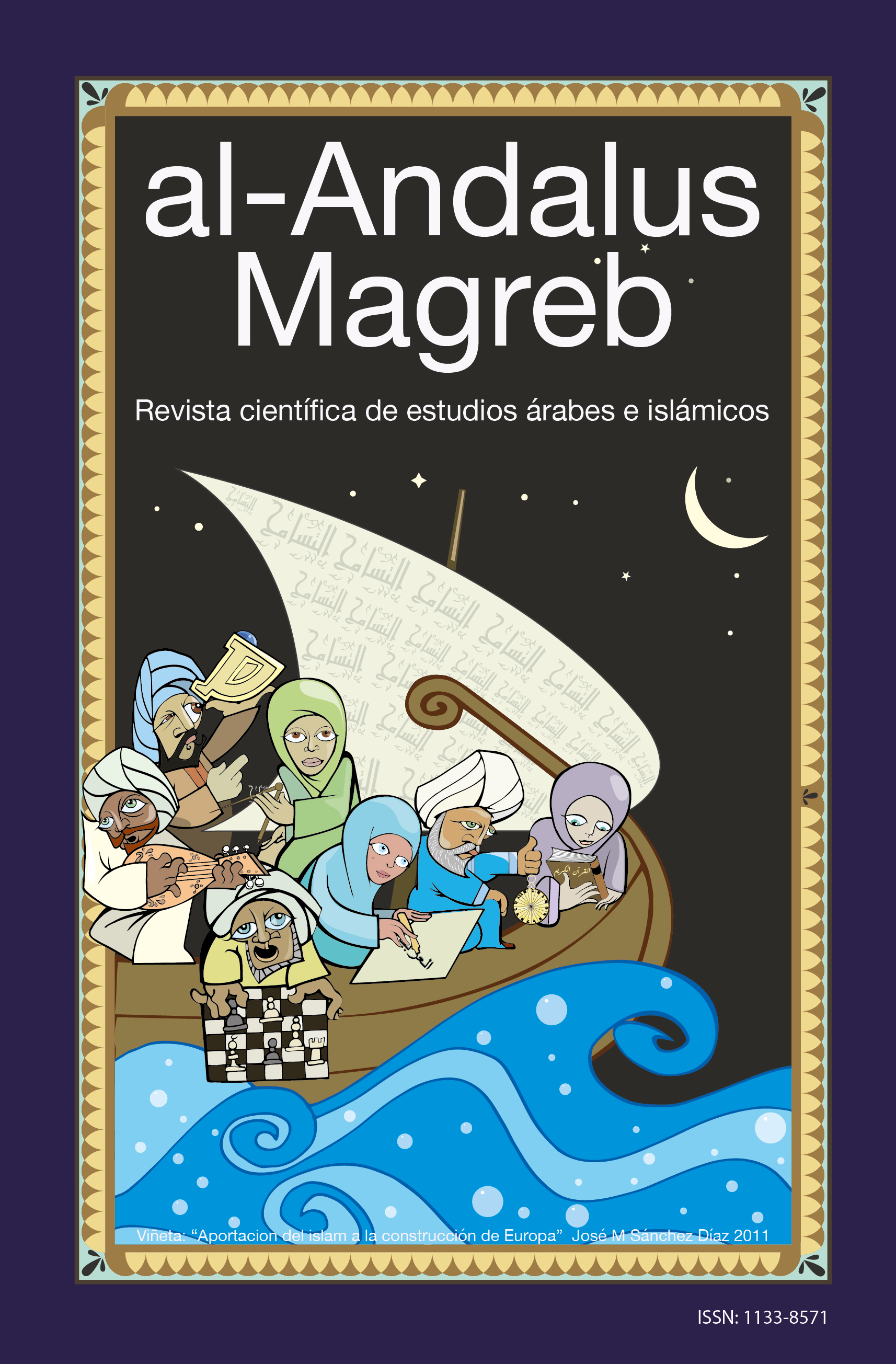مشكلة الذكريات: الأدائية وإحياء ذكرى الثورة المصرية

التنزيلات
- PDF (Español (España)) 148
- EPUB (Español (España)) 81
- VISOR (Español (España))
- MOVIL (Español (España))
- XML (Español (España)) 86
DOI
https://doi.org/10.25267/AAM.2023.v30.08معلومات
الملخص
: يهدف هذا المقال إلى دراسة وتحليل الأعمال الاستذكارية والآثار الأدائية من مختلف الأشكال الاجتماعية التي تم من خلالها إحياء ذكرى الأحداث الثورية التي جرت في مصر في عام ٢٠١١. هذا المقال يركز على مفهوم "الثورة". وجد العالم الاجتماعي الفرنسي موريس هالبواكس (٢٠٠٤) أنّ الذاكرة تُبنى اجتماعياً وتتأثر بعوامل اجتماعية مختلفة. عندما يتعلق الأمر بالاحتفال والتذكر، فقد تم إعادة صياغة مفهوم "الثورة" ومعانيه المتعددة وفروقه الدقيقة، وإدخاله في ممارسات الذاكرة على مدى العقد الماضي في مصر(إرل ٢٠٠٨). من أجل فهم العلاقة ما بين التذكر والثورة، نقترح الهدف المزدوج التالي: أولا، وضع تحليل مفاهيمي حول مفهوم "الثورة" في التاريخ المصري الحديث، و ثانياً، فهم كيف أدّت عملية الذكرى إلى ظهور روايات جدلية يجب وضعها في سياقها وفي قالب العمليات الأدائية لإعادة تمثيل "الثورة". يتجسد هذا "الهوس بالذاكرة" (عطاالله ٢٠٢١) في محاولة جماعية لإعطاء اسم للأحداث التي أعادت تعريف علاقة الفرد بالجماعة وعلاقة الجماعة بماضيها.
الكلمات المفتاحية
التنزيلات
الوكالات الداعمة
كيفية الاقتباس
الرخصة

هذا العمل مرخص بموجب Creative Commons Attribution-NonCommercial-NoDerivatives 4.0 International License.
يوافق المؤلفون الذين تُنشر مقالاتهم وبحوثهم في هذه المجلة على الشروط التالية:
أ) يجوز للمؤلفين الحفاظ على حقوق التأليف والنشر الخاصة بهم، وعليهم أن يضمنوا للمجلة حقوق نشر مقالاتهم لأول مرة، وتخضع هذه الحقوق في نفس الوقت لرخصة المشاع الإبداعي
التي تسمح لأطراف ثالثة بمشاركة العمل المنشور طالما تم ذكر المؤلف وأن العمل نشر للمرة الأولى في هذه المجلة.
ب) يجوز للمؤلفين توقيع اتفاقية رخصة أخرى غير حصرية لتوزيع نسخة العمل المنشور (على سبيل المثال: إيداعه في سجل إلكتروني مؤسسي) شريطة ذكر النشر الأول في هذه المجلة.
ج) يسمح للمؤلفين وينصح بنشر مقالاتهم عبر الشبكة العالمية (على سبيل المثال في سجلات إلكترونية مؤسساتية أو في الموقع الإلكتروني الخاص بهم) مباشرة بعد قبول البحث لنشره في المجلة، إذ أن ذلك قد يؤدي إلى تبادلات مثيرة للاهتمام وإلى زيادة الإشارات إلى المقالات المنشورة واقتباس مضامينها (انظر "أثر الولوج المفتوح والمتاح للجميع").
المراجع
Achcar, Gilbert (2013): The People Want. A Radical Exploration of the Arab Uprising, London: Saqi Books.
Adly, Amr (2014): «Egypt’s Conservative Nationalism: Discourse and Praxis of the New Regime», Jadaliyya [en línea], disponible en: https://www.jadaliyya.com/Details/31358 [consultado el 05/09/2022].
Amer, Fatma (2018): «Memory and Revolution: How Have Web-Based Art Platforms Contributed to Preserving January 25?», Jadaliyya [en línea], disponible en:
https://www.madamasr.com/en/2018/01/27/feature/culture/memory-and-revolution-how-haveweb-based-art-platforms-contributed-to-preserving-january-25/ [consultado el 30/06/2021].
Amnistía Internacional (2015): «Sangre, muerte y llamas: Recuerdo de la masacre de Rabaa en Egipto», Amnistía Internacional [en línea], disponible en:
https://www.amnesty.org/es/latest/news/2015/08/egypt-blood-death-and-flames-memories-ofthe-rabaa-massacre/ [consultado el 14/07/2022].
Arendt, Hannah (1988): Sobre la revolución, Madrid: Alianza Editorial.
Atallah, Lina (2021): «Ba‘ad al-ashi!’ allatī ta‘allamtuh! ‘an kayfa la natadhakar al-thawra» Mada
Masr [en línea], disponible en: shorturl.at/osUX9 [consultado el 09/09/2021]
Assmann, Jann (1992): Cultural Memory and Early Civilization. Writing, Remembrance, and Political Imagination, Massachusets: Cambridge University Press.
Barsalou, Judy (2012): «Recalling the Past: The Battle over History, Collective Memory and Memorialization in Egypt», Jadaliyya [en línea], disponible en: https://www.jadaliyya.com/Details/26242 [consultado el 30/06/2022].
Cortés, Julio (1996): Diccionario de Árabe Culto Moderno. Árabe-Español, Madrid: Editorial Gredos.
Erll, Astrid (2011): Memory in Culture, New York: Palgrave MacMillan.
Fahmy, Khaled (2012): «Archiving the revolution. Panel discussion», Khaledfahmy.org [en línea], disponible en: https://khaledfahmy.org/en/2012/11/21/archiving-the-revolution/ [consultado el 15/05/2021].
Gorman, Anthony (2003): Historians, State and Politics in Twentieth Century Egypt: Contesting the Nation, London, New York: Routledge Curzon.
Halbwachs, Marice (2004) : Los marcos sociales de la memoria. Madrid: Anthropos.
Haugbolle, Sune (2019): «Memory Studies in the Middle East: Where Are We Coming From and Where Are We Going? » Middle East Critique 28(3), pp. 279-288. DOI: https://doi.org/10.1080/19436149.2019.1633742
Huyssen, Andreas (1995): Twilight Memories: Marking Time in a Culture of Amnesia, New York: Routledge.
Kam!l, Ma"m#d (2014): «al-Ḥarb ‘ala al-hawiyya», Al-Masry al-Youm [en línea], disponible en: https://www.almasryalyoum.com/news/details/589201 [consultado el 03/06/2022].
Koselleck, Reinhart (1993): Futuro Pasado. Para una semántica de los tiempos históricos, Barcelona: Paidós.
Koselleck, Reinhart (2004): «Historia de los conceptos y conceptos de la historia», Ayer 53(1), pp. 27–45.
Koselleck, Reinhart (2012): Historias de conceptos. Estudios sobre semántica y pragmática del lenguaje político y social, Madrid: Editorial Trotta.
Levy, Bertrand (2012): «Urban Square as the Place of History, Memory, Identity», Memory of the City, eds. Dusica Drazic, Slavica Radisic, Marijana Simu. Belgrado: Kulturklammer, pp. 156– 73.
Lewis, Aidan; Nadeen Ebrahim (2020): «Cairo’s Tahrir Square Gets a Contested Makeover», Reuters [en línea], disponible en: https://www.reuters.com/article/egypt-tahrir-squareidINKCN2561OK [consultado el 03/09/2022].
Ma"m#d, Rīm (2021): «Dimn safa"!t taqala%at ma’ al-zaman, al-man!hij al-madrasiyya al-mi%riyya al-"!liyya tadhkur qashwr!n min thawra 25 yīn!īr», Rassef22 [en línea], disponible en:
https://raseef22.net/article/1081255-%D8%B6%D9%85%D9%86-
%D8%B5%D9%81%D8%AD%D8%A7%D8%AA-
%D8%AA%D9%82%D9%84%D8%B5%D8%AA-%D9%85%D8%B9-
%D8%A7%D9%84%D8%B2%D9%85%D9%86-
%D8%A7%D9%84%D9%85%D9%86%D8%A7%D9%87%D8%AC-
%D8%A7%D9%84%D9%85%D8%AF%D8%B1%D8%B3%D9%8A%D9%8A%D8%A9-
%D8%A7%D9%84%D9%85%D8%B5%D8%B1%D9%8A%D8%A9%D8%A7%D9%84%D8%AD%D8%A7%D9%84%D9%8A%D8%A9-
%D8%AA%D8%B0%D9%83%D8%B1-%D9%82%D8%B4%D9%88%D8%B1%D8%A7-
%D9%85%D9%86-%D8%AB%D9%88%D8%B1%D8%A9-25 [consultado el 04/09/2022].
Masr, Mada (2018): «858: Archiving as a Tool of Resistance. On Revolución, Non-Production and Subversive Documentation» Mada Masr [en línea], disponible en: https://www.madamasr.com/en/2018/02/11/feature/culture/858-archiving-as-a-tool-ofresistance/ [consultado el 04/08/2021].
Mosireen (2018): «M! Hadh! Al-sh!y?», 858. Archive of resistance [en línea], disponible en:
https://858.ma/ [consultado el 04/04/2022].
Nora, Pierre (2008): Les lieux de la mémoire, Montevideo: Ediciones Trilce.
Pérez Baquero, Rafael (2021): Trauma, Recuerdo y Duelo. Una aproximación filosófica a las relaciones entre memoria e historia, Granada: Editorial Comares.
Pérez Baquero, Rafael (2017): «Las discontinuidades entre la memoria olectiva y Lal historia: Una crítica a artir de la experiencia del Holocausto» Thémata. Revista de Filosofía (56), pp. 41–60. DOI: https://doi.org/10.12795/themata.2017.i56.02
al-Qubb$, Murshid (2014): Al-thawra fi-l-fikr al-‘arab$ al-mu‘!sir, D!r al-baydà: al-markaz althaq!f$ al-‘arab$.
Rashwan, Nada (2013): «Rabaa’s New Army-Installed ‘Memorial’: Fresh Paint, Bitter Reminder», Anadolou Agency [en línea], disponible en: https://www.aa.com.tr/en/archive/rabaas-newarmy-installed-memorial-fresh-paint-bitter-reminder/204243# [consultado el 14/07/2022].
Sabaseviciute, Giedre (2011): «Re-Creating the Past: The Manipulation of the Notion of Rupture in Egyptian Revolutions», La Révolution française [en línea], DOI: https://doi.org/10.4000/lrf.348.
Traverso, E (2021): Revolution. An Intellectual History, New York: Verso Books.
Thompson, Levi, Emily Drumsta, Elias G. Saba (2019): «Translating Tahrir. From Praxis to Theory with Tahrir Documents », The Routledge Handbook or Arabic Translation, eds. Sameh Hanna, Hanem El-Farahaty, Abdel-Wahab Khalifa, London: Routledge, pp. 176-188.







